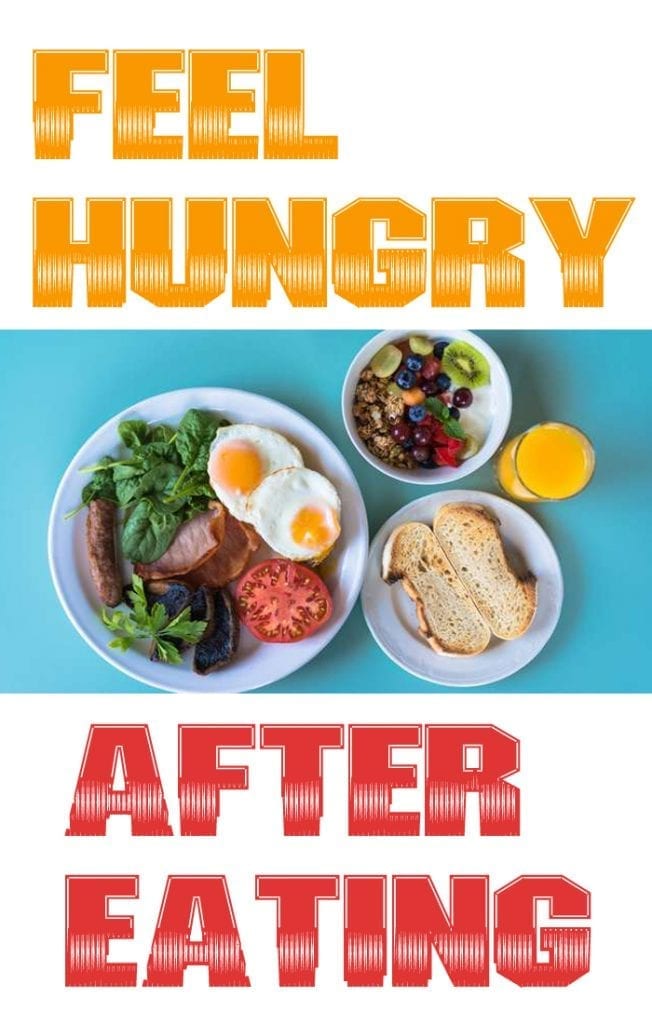Have you ever finished a big meal but still felt hungry?
There are two overriding issues that can drive you to feel hungry after eating:
- You’re missing a few basic nutrition tips. If you make a few relatively easy changes to your diet and behavior then you’ll feel more full.
- You’re dealing with trauma and other deeper emotional issues. No quick nutrition can solve trauma, but understanding how trauma impacts hunger can help you heal.
This article is going to mostly cover the first overriding issue of nutrition.
In particular, it describes seven specific reasons behind feeling hungry and provides tips you can apply today to stop feeling hungry after eating.
Then, there’s a video link at the bottom of the post where I talk about why trauma and other emotional wounds can keep you feeling like you need “more, more, more” even after a big meal.
Let’s dive into the seven nutrition reasons and tips!
1 – Not Enough Calories Compared To Your Exercise
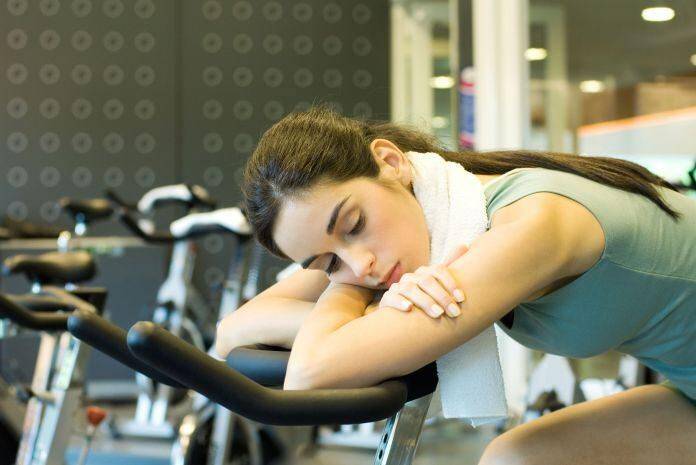
Exercise can easily make you feel hungry all the time, even after eating a big meal.
However, it’s possible that you actually are exercising and chewing up calories even when you don’t think you are exercising!
For example, you may be ‘exercising’ when you go grocery shopping. All that lifting and pushing the cart around can end up being a lot of movement!
Or, you may go on a hike to find some stress relief. While your intention may be to reduce stress, the hike can still count as exercise even if you aren’t thinking in such terms!
The overall lesson behind too much exercise is simple and has to do with a concept called a ‘calorie deficit’.
A calorie deficit means your body is using more energy than it is consuming.
If you ‘burn’ more calories than you eat, your body will develop a desire to eat. It’s that simple.
What most people don’t realize is that you burn calories just by breathing, thinking and walking around!
So let’s say you are under a lot of stress, go on a jog to relieve that stress, and then work on a paper for school or work all in one morning.
Between the stress, jog, and working on your paper let’s say you use up 1000 calories.
You had skipped your breakfast meal because you were busy but then had a lunch worth 700 calories.
You just ate your lunch meal, but still feel hungry eating. Do you see why?!
In our mock example, you were at a deficit of 1000, and then you ate 700. You are still at a deficit of 300 and this can go a long way to explaining why you feel hungry after eating.
Here’s the bottom line: if you are at a caloric deficit then you will feel hungry.
Even if you eat lots of food, if you are still at a caloric deficit after eating then you will still feel hungry after eating. A quick fix for this is sugar, by the way, and this could be why you’re craving sugar.
This principle of being calorically deficient will be a major theme through the other 6 quick nutrition and health tips.
Tip: If you are hungry, think back to see if you have been particularly active, even doing innocuous things like long walks!
2 – Need More Protein
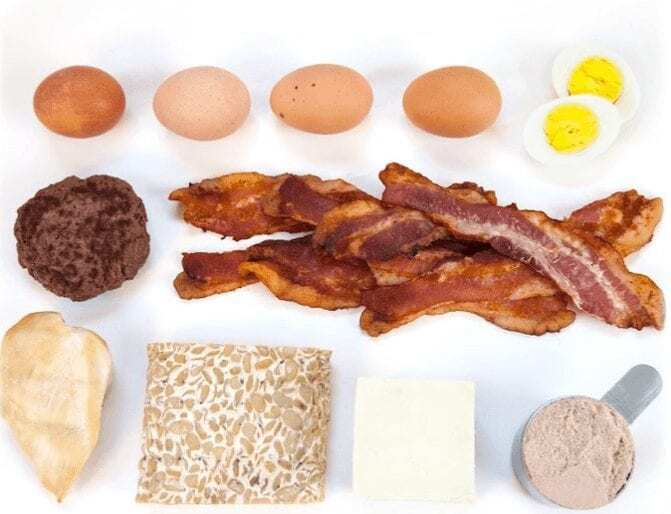
You’ve probably heard this before – “eat more protein”.
While this advice may seem cliche and is very common in the advice you hear to lose weight, protein is common advice for a good reason. It works!
Many studies show that protein can help you feel more full.
Protein helps you feel more full for several reasons:
- Your stomach digests protein more slowly
- Protein may stimulate fullness ‘hormones’ to be released (more on hormones like ‘leptin’ down below)
Plus, protein is used in muscle growth and recovery.
Now if you are eating protein but still feel hungry after eating, please consider this common protein mistake.
One of the most common mistakes people make with protein is eating some but not enough protein in their meal.
For example, my friend and I recently prepared some sandwiches together and we started talking about food.
(In my social circles everybody knows me as the ‘eating guy’ so it’s pretty common for people to talk to me about food, proper eating and so forth.)
My friend made a remark, as he put a slice of turkey in between two slices of bread. He said, “Look, Jared! I’m getting some protein!”
I glanced down at the sandwich he had prepared:
- Two slices of white bread
- Two thin slices of turkey
- Lettuce, tomatoes, onions
- Mayo
At first glance you may think that my friend was eating some turkey and that he was therefore eating ‘protein’.
However, my friend was not eating enough protein. He needed more like 10 slices!
If you are eating protein but still feel hungry after eating, try this: eat more protein and see how you feel.
And of course, if you are eating meals without any protein then be sure to add some protein too!
Here are some examples of meals you might be eating which lack enough protein:
- Cheese pizza
- Salad with very little chicken
- Cereal
- Too small of snacks
Tip: Eat more foods with higher protein content such as lean meats, eggs, peanut butter and nuts. And be sure to get enough of these higher protein foods too!
3 – Eat More Throughout The Day
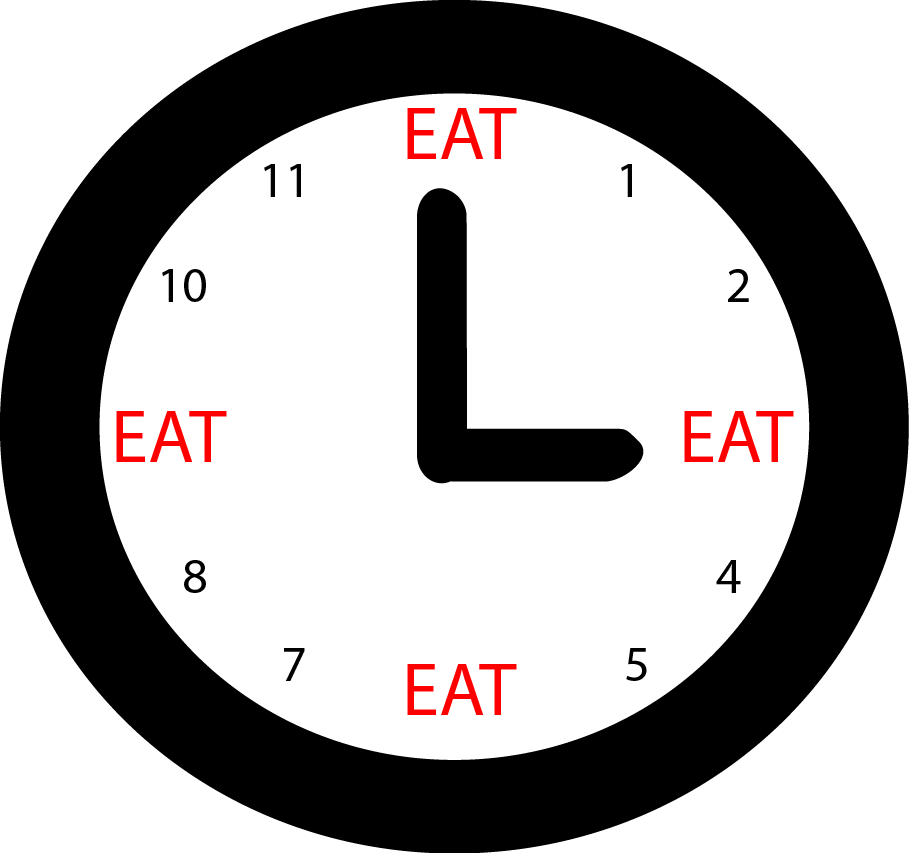
As we mentioned earlier, a caloric deficit means your body is using more energy than it is getting.
When your body has a calorie deficit, generally speaking you will be hungry.
While this guideline does hold up, there can be exceptions which might seem strange.
The most common scenario which might baffle you is when you are not skipping meals but still your hunger flares up like a lion, suddenly and out of the blue.
In our previous examples, we talked about ‘easy to spot’ calorie deficits.
However, in these examples, we are talking about 1 day.
It’s pretty easy to understand how if you skip breakfast, lunch or meals in general, this can lead to calorie deficits and the feeling of being hungry after eating later that day.
But what if your hunger jumps out at you out of the blue!
If you are not skipping meals and you suddenly feel hungry even after eating a big meal, the most likely reason is that your calorie deficit has caught up to you.
In this situation your hunger may be normal for days or even weeks.
Most of the time, you’ll feel full after a meal and don’t think about your hunger.
But every now and then, your hunger just suddenly is crazy! You feel hungry even after eating a huge meal.
These situations are best explained by a calorie deficit that has slowly grown from a small deficit to a large deficit.
You may have heard this phrase before, ‘the straw that broke the camel’s back.’
See, a calorie deficit can be carried through for weeks and even months at a time.
You may be undereating slightly each meal.
While you may not feel hungry right away, over time you are getting more and more ‘in debt’.
Your calorie deficit is growing bigger even though you are not consciously aware of this.
Here are some reasons you may not feel your hunger right away:
- Stress
- Busyness
- Long to do list
- Multi-tasking
- Past history of dieting (more on this later)
Then, one day, your calorie deficit becomes too big and suddenly you have outrageous hunger.
You feel super duper hungry even after eating!
Why? It’s because your calorie deficit slowly grew into a monster of an appetite!
Tip: Eat a solid breakfast, lunch and dinner that fills you up and see how your hunger cravings are later in the day. If you miss a meal, see what happens to your cravings.
4 – Wellness Programs Are Diets In Disguise
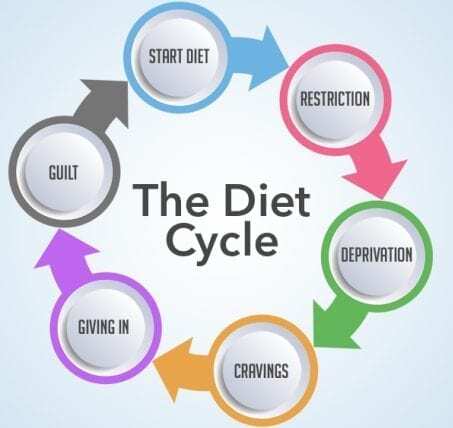
Dieting of course, puts you in a huge caloric deficit.
You basically eat less on a diet, in hopes of weight loss.
However, dieting eventually doesn’t work because the caloric deficit becomes too big and then your hunger becomes insatiable.
If you are reading this blog article, I’m going to assume that you are already aware that dieting is dangerous.
The gist of it is pretty simple to understand: diets lead to weight gain very often!
Why? When you under eat and deprive yourself, you end up always being hungry and then eating way too much!
Of course this doesn’t result in weight loss, but the opposite — weight gain.
However, even if you understand this, you still may not be aware that many wellness programs are actually diets and weight loss programs in disguise!
Take a look at these common wellness trends these days:
- Detoxes
- Cleanses
- Food elimination
- Gluten free
Now let me ask you a simple question: how many of these programs ask you to eat less, or indirectly have weight loss as their goal?
All of them!
With cleanses, you eat less for a day or a week. Same with detoxes. Food elimination you literally stop eating certain foods.
These aren’t called ‘diets’ per se, but can you see that they still put you in caloric deficits?!
Remember, caloric deficits add up.
While you may not feel hungry after eating for sometime, eventually, the placebo effect these wellness programs give you wears off and you are left starving.
Here’s my advice: beware.
Here’s a simple question to screen for potential diets in disguise: do these programs ever mention feeling full?
Most talk vaguely about feeling ‘clean’ or ‘energized’ but it’s rare that they actually talk about feeling full.
If you are asking yourself, why am I always hungry, then perhaps you have the answer here:
The detoxes and cleanses are screwing you over!
Tip: Think about whether you are on an official diet or are following some sort of ‘wellness’ program. Perhaps your hunger is related to this program!
5 – Hydration
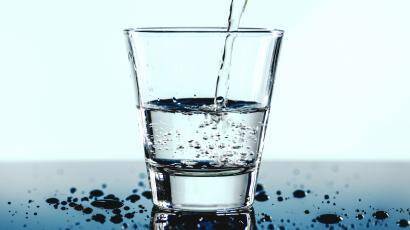
Hunger and thirst are tricky to separate.
Hunger tends to be more in your belly while thirst is more in your throat, but these sensations are not easily separated.
To make things even more confusing, juice and soda companies market their beverages as ‘thirst quenching’ even though many of their drinks will make you even thirstier!
For example, Coca-Cola is commonly marketed as ‘thirst quenching’.
And Coca-Cola can indeed seem ‘thirst quenching, at least at first!
However, Coca-Cola is a soda with caffeine.
The caffeine content in the soda causes your blood sugar levels to spike! Then your blood sugar levels cause you to get all giddy and energized.
Unfortunately, all the caffeine and elevated blood sugar levels don’t actually hydrate you!
Indeed, caffeine requires water to digest properly, so caffeine cancels out any hydration effect from the liquid in the soda.
So in the longer run, instead of hydrating you, Coca-Cola is giving you a sugar and caffeine high.
Your thirst is getting covered up temporarily by chemicals, but deep down you are still thirsty.
If you have a habit of drinking fruit juices, sodas or coffee you can easily be falling into confusion about whether you are hungry or thirsty.
For example, you may feel hungry after eating …
But what if you are really thirsty after eating and are just mistaken about your feeling of hunger versus thirst?
Try taking out the sodas, coffee and fruit juices for a few days and drinking water instead.
Leave me a comment down below with your results 🙂
6 – Lack of Sleep
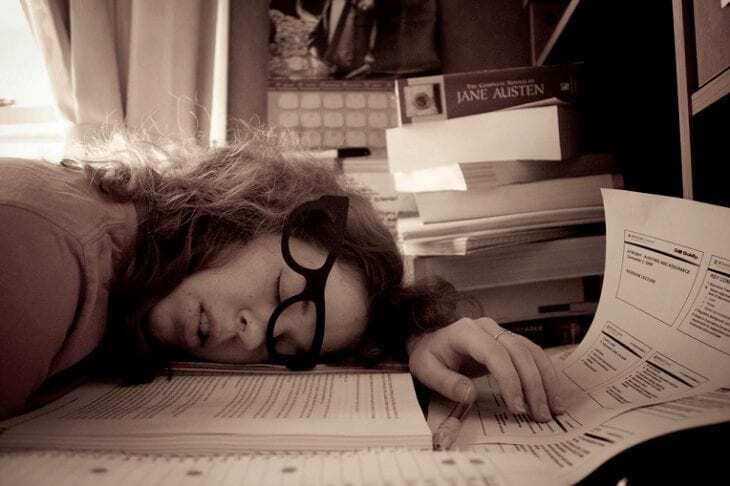
If you lack sleep, it becomes much more difficult to interpret bodily sensations.
The normal confusion between hunger versus thirst can be magnified to a crazy degree if you are lacking sleep.
While sleep doesn’t directly relate to calorie deficits, a body of research clearly links lack of sleep to obesity.
Overall, your body just doesn’t process information well if you are too tired, and this in turns makes you more likely to overeat.
It’s possible that a lack of sleep combined with a few of the other factors listed above, like lacking protein or enough food in general, can make you feel hungry after eating.
Or … maybe you just need something else after eating because you didn’t sleep enough!
In that case, you may think you need more food, but maybe your body, mind and soul are simply calling for a break!
Tip: Try taking a 10 minute nap.
7 – Eating Too Quickly & Mindlessly

If you eat your food too fast you may feel hungry afterwards.
Many studies show that people who eat faster report feeling less full, despite eating similar amounts as people who eat slower.
Why?
Your stomach takes about 15-20 minutes to register food sensations. In this 15-20 minute time period you can basically eat as much food as you’d like and still not feel full.
This biological phenomenon allowed our ancestors to quickly eat tons of food when available.
For example, if a cavemen killed a wooly mammoth there would be too much meat for even the whole tribe to eat all at once.
And back then they didn’t have refrigerators so all that meat would go to waste as it couldn’t be stored and would rot!
Fortunately, humans developed so as to not register that they had eaten food until about 20 minutes later.
During this time they could eat tons of food and not waste anything!
If you wolf down your meals, this could easily explain why you feel hungry after eating.
Tip: Slow down a little bit, just a little. Try to chew your food more. Try to enjoy your food more 🙂
How Do I Stop Feeling Hungry After Eating?
Generally speaking, to stop feeling hungry after eating you need to address the 7 bullet points above:
- You gotta make sure you aren’t exercising yourself into the ground or burning yourself in other ways, without getting enough calories
- You need to make sure you are eating protein and other well-balanced meals
- Make sure you are getting enough food in general
- Don’t fall for those tricky diet traps
- Relax and get plenty of sleep
- Watch out for those tricky drinks because you might just be thirsty
- And finally, slow down, see if that helps you feel more full after eating 🙂
But …
There are situations that are more nuanced and complex, which involve trauma or past dieting experiences which may have permanently changed your metabolism and hormonal levels.
For example, what happens if you have trauma around food as a kid?
I talk about these situations here in this video:
